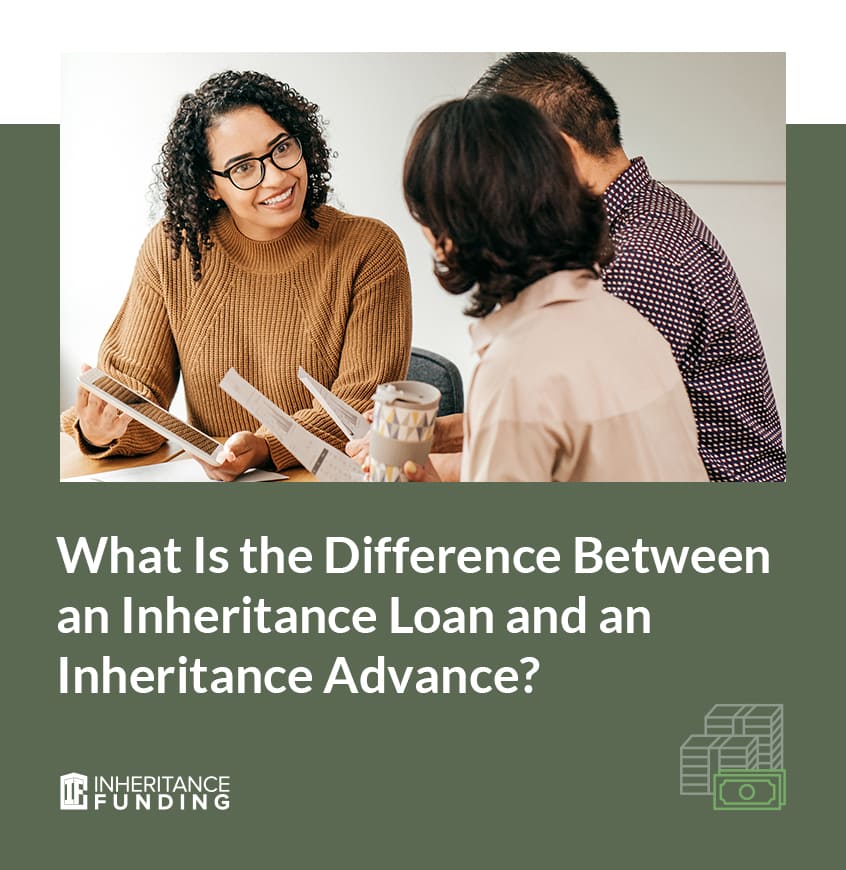What is an Inheritance Loan?
An inheritance loan may also be referred to as an estate loan, inheritance advance loan or probate advance loan. The term inheritance loan is sometimes mistakenly used interchangeably with inheritance advance, but there are key differences between these options for inheritance funding. With inheritance cash loans, you borrow against your inheritance, using your inheritance as collateral for the loan.
Despite being called a loan, you typically cannot get an inheritance loan from a traditional lender. When you apply for an inheritance loan, your lender evaluates your loved one’s estate and determines how much you stand to inherit from the estate. Then, they offer a loan based on that amount.

The lender will likely offer you an immediate payment that is less than your full inheritance amount at a fixed interest rate. In exchange, you give the lender the right to receive the full amount of your inheritance when probate ends. Essentially, this means you assign your lender the rights to your inheritance to repay your loan plus interest.
What Are the Benefits of an Inheritance Loan?
With an inheritance loan, you can quickly receive a portion of your inheritance. You can then use this money as you see fit, such as covering funeral costs, debts or a mortgage payment. After a loved one’s death, the last thing you want to worry about is money, and an inheritance loan may help you avoid the stress of wondering how you will cover your immediate expenses.
What Are the Disadvantages of an Inheritance Loan?
Though you might want to get your inheritance as soon as possible, you should consider the disadvantages of inheritance loans.
- The lender is involved in the estate’s probate: An inheritance loan introduces a stranger into the probate process, which could extend the process, disrupt the case and add conflict between you and your family. Probate lending frequently causes more conflict than other sources of conflict in an estate, including handwritten wills and disinheriting family members.
- The risk and cost of an interest rate: Inheritance loans tend to be costly, especially in comparison to what you receive. If you get a loan and the probate goes quickly, you could lose a large portion of your inheritance in exchange for getting a portion of your money a few weeks earlier than you otherwise would have. Depending on how long the probate process takes, you could face a high interest rate, even for small inheritance loans.
- The risk of predatory lenders: Since probate lending is largely unregulated, lenders can prey on customers. Many people don’t know much about the probate process, which can make it easy for lenders to use predatory practices. If you still want an inheritance loan, carefully review the information the lender provides to ensure you understand what you stand to gain and what you could lose.
Inheritance loans are often more expensive than other loans, and you will receive less money from your lender than you would have received if you waited until the end of the probate process.
Is an Inheritance Loan the Same as an Inheritance Advance?
No, an inheritance loan is not the same as an inheritance advance. An inheritance advance is another option for receiving your money from your inheritance, which is also sometimes called an inheritance cash advance, estate advance, probate advance, or probate cash advance. The probate process to distribute funds to a rightful heir in the United States takes 17 months on average. With an inheritance cash advance, you can access your inheritance immediately once your loved one’s estate opens. This allows you receive your money long before the estate closes, which can be a lengthy process.
But is probate advance legit? Many heirs are concerned about the legitimacy of this option, and it’s important to understand how it works.
So, How Does an Inheritance Advance Work?
After a loved one passes, you can seek an inheritance advance company that provides this service, like Inheritance Funding. Traditional lenders like banks and credit unions don’t offer inheritance advances.
You can view the advance provider’s requirements and request a consultation to determine whether you qualify. The advance company can assess your situation, and if you’re eligible, you can begin the advance process. You will share details about the inheritance and provide the following documents:
- A copy of the death certificate
- Valid identification
- A copy of the will, if available
- Probate petition
- Letters of administration
You will also provide the executor or trustee’s name. With this information, the advance company can review your case, make the offer and give you the advance you seek. The speed of the advance process depends on the company.
But Do I Need to Pay Anything for an Advance on My Inheritance?
The cost of an inheritance advance varies depending on several factors, including the size of the advance, the complexity of your loved one’s estate and the amount of time until your relative’s estate closes. At Inheritance Funding, we guarantee that you will receive the lowest available price, and we offer a rebate for early repayment.
Instead of paying us directly, you will sell or assign Inheritance Funding a fixed amount from your share of the estate. We agree on this assignment amount and list it in your contract before paying your inheritance advance. The estate pays us directly upon distribution, so you personally make no payments to us. If any money remains after we receive our assigned amount, the estate distributes it to you directly.
Additionally, we offer rebates if we receive repayment for your advance sooner than expected. These substantial rebates are detailed in our pricing for inheritance advances to give you the best possible deal. If you submit your payment in full before the early payoff rebate date, you will receive your rebate amount within five business days.
How Do I Know if I Qualify to Receive an Inheritance Cash Advance?
If you have an inheritance of at least $10,000 from your loved one’s probate estate, you may be eligible for a probate advance. The probate estate should be open or in the process of being opened. If you are unsure how much you will receive in your inheritance, you can still reach out to us for a free consultation.

You can also qualify for an inheritance cash advance even if you have credit problems, such as bankruptcy, delinquencies and foreclosures. A poor credit record will not prevent you from receiving an inheritance advance. Though we may still obtain a copy of your credit report to prepare for funding, this is primarily used to determine if there are child support payments, judgments or bankruptcy proceedings that could impact the assignment’s eventual payment.
You must also be an heir in the U.S., as we do not work with estates that exist outside the country. However, we can help you if you live in the U.S. and the estate is open in a different state. This is a common scenario, and we regularly work with estates throughout the country.
Are Probate Loans the Same as Inheritance Loans?
Yes, a probate loan is the same thing as an inheritance loan. A loan from a probate lender may offer you competitive terms, rates and interest-only payments.
After the loss of a loved one, managing their probate estate and dealing with the complicated financial and legal process is likely the last thing you want to worry about while grieving. Unfortunately, many families are forced to take on this burden during the probate process. Understanding this process, as well as probate loans, can help you more successfully navigate the steps involved.
What Is a Probate Loan?
A probate loan uses your inheritance as collateral so you can receive cash now. This type of loan can solve tricky estate issues and offer flexibility to the administrator, allowing them to execute the deceased person’s wishes more easily. It can also help beneficiaries obtain their inheritance shares without needing to sell any valuable family property.
People who recently inherited real estate may consider a probate loan, especially if they were financially dependent on their deceased loved one. Probate can drag on for months or years following a loved one’s death. With a probate loan, heirs can get cash right away by capitalizing on the value of the real estate.
Can I Get a Loan to Pay Inheritance Tax?
Whether you need to pay an inheritance tax depends on who handles the estate assets, typically the estate’s executor or personal representative. This person is responsible for paying tax bills and filing tax returns. Inheritance taxes are handled differently from state to state, but only large estates are required to pay a federal estate tax.
Who Needs to Pay Inheritance Tax?
Just a few states charge inheritance tax when you receive an inheritance after a loved one has died. If the estate exists in any of the following states, you may have to pay inheritance tax:
It does not matter whether you live in one of these states or not. Instead, it only matters where your deceased loved one lived. If your loved one’s estate is in one of these states, you may be subject to an inheritance tax. For example, if you live in New York and inherit money from a relative who lived in Pennsylvania, you may have to pay inheritance taxes to Pennsylvania.
How to Pay Inheritance Tax
Inheritance tax comes out of your pocket rather than from your loved one’s estate. The amount you pay depends on the amount you inherit and what your relationship was with the deceased person. Since you cannot use the estate’s assets to pay the inheritance tax, you may want to consider obtaining a loan to cover the cost of the tax.
For example, if the estate exists in a state that charges a 4% tax on inheritances worth more than $1 million and you inherit $3 million, you will only pay an inheritance tax on $2 million. This means you would pay an inheritance tax of $80,000. You will report this information on your tax form for the inheritance.
Who Is Exempt From Paying Inheritance Tax?
In some cases, you may be exempt from paying inheritance tax. If you have a very small inheritance or inherit property from your spouse, for example, you may be exempt from paying inheritance tax. If you are a child of the deceased or another dependent, you may also qualify for an exemption or a reduction in the amount of tax you are required to pay.
Typically, those who inherit property from someone who is not a relative will pay the highest inheritance tax rates. In Pennsylvania, for example, inheritance tax is 0% for surviving spouses and parents of children age 21 or younger, while siblings pay a 12% tax.
Inheritance Loan vs. Advance
So which is better — an inheritance loan or an inheritance advance? An inheritance advance is better than an inheritance loan because there is no interest and no monthly payments. Unlike an inheritance loan, advances allow you to pay a flat fee from your inheritance. If you work with Inheritance Funding, we arrange repayment directly from the estate, so once you are approved — which can take less than 24 hours — you’re done and do not have to worry about payment again.

You will also not be personally liable if there are insufficient funds in the estate and the money does not cover the payment to the probate funding provider. With an inheritance loan, your inheritance is considered collateral, and you may be personally liable if the estate does not have enough money to repay your lender. However, with a cash advance, you are not required to provide collateral, pay interest or make monthly payments.
How to Choose the Right Inheritance Advance Company
The company you choose to handle your inheritance advance matters. Here are a few details you should consider when selecting a company:
- How much money the company offers as an advance
- The percentage the advance company purchases
- Any added fees and when they are due
- How fast they offer money
These factors can help you narrow your options and find the best fit for your situation. You should also consider the company’s reputation. Look at reviews to determine how past customers feel about the company’s service, speed of payment and other details.
Apply to Get Inheritance Money Now
Receiving your inheritance should be a fast, painless process. Unfortunately, inheriting money usually occurs slowly, and the legal process often involves delays and roadblocks that keep you from receiving your cash when you need it to cover funeral costs and other expenses. At Inheritance Funding Company, Inc., we know how frustrating the process can be, and we believe you should not have to wait for your cash. This is why we work to get heirs their money fast.
If you have just lost a loved one and are in line to receive an inheritance, we can help you get your cash as soon as the day of your application approval. Apply for an inheritance cash advance from Inheritance Funding today.



